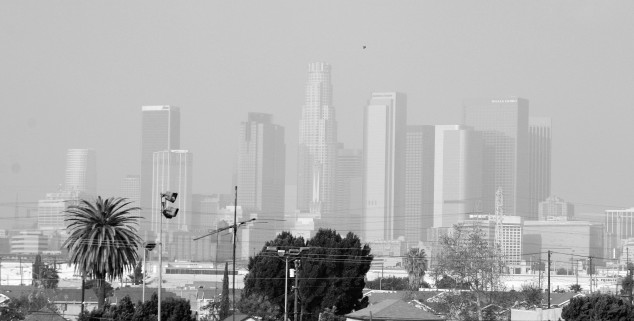Opinion
January countdown: Fuel policy good for health — and wallet
 Smoggy air envelops downtown Los Angeles. (Photo: Shutterstock).
Smoggy air envelops downtown Los Angeles. (Photo: Shutterstock).Despite strong efforts to ratchet down on smog and soot pollution, California still has some of the worst air quality in the nation and most urban areas in California continue to struggle with polluted air.
The American Lung Association’s 2014 State of the Air Report confirms this fact and ranks six California cities on the list of the top ten worst polluted cities in the country for ozone and particle pollution.
Los Angeles heads the list for ozone with several San Joaquin Valley cities not far behind. The transportation sector is the largest source of pollution in California, harming the health of many communities across the state.
By 2025, the increase in cleaner, low-carbon fuels due to the Low Carbon Fuel Standard and cap and trade, will prevent 600 heart attacks, 880 premature deaths, 38,000 asthma attacks, and almost 75,000 lost work days – all caused by air pollution.
Cars, trucks, buses, vehicles used in freight, construction and agriculture and the dirty fuels they run on all contribute to this problem. Despite these sobering statistics, there’s good news to help California cut through all the smog and soot.
This January, transportation fuels will be included in the state’s cap and trade program under California’s landmark climate law, AB 32. This means that fuel providers will finally be held responsible for the carbon pollution generated by their fuels. The expansion of cap and trade along with the state’s Low Carbon Fuel Standard and Advanced Clean Cars program will collectively help Californians shift away from our dependence on dirty energy sources and inefficient vehicles.
Driving California Forward, a report jointly authored by Environmental Defense Fund and the American Lung Association in California, shows that the state’s clean energy policies provide a three-fold benefit to help transition to cleaner fuels: improved health through better air quality, less carbon pollution degrading the environment, and increased energy security. The health benefits are expressed both in avoided health and medical costs, and in avoided cases of illness and early death over the next ten years.
By 2025, the increase in cleaner, low-carbon fuels due to the Low Carbon Fuel Standard and cap and trade, will prevent 600 heart attacks, 880 premature deaths, 38,000 asthma attacks, and almost 75,000 lost work days – all caused by air pollution. Also by 2025, these policies will result in reduced consumption of 21.4 billion gallons of gasoline and 11.8 billion gallons of diesel fuel. By promoting homegrown cleaner fuels, these two programs will reduce reliance on foreign imports and cut over $100 billion in gas and diesel expenditures. And they help us move forward toward the goal of greater reliance on the cleanest, most sustainable fuels for the long term, including electricity and hydrogen from renewable sources.
All told, Driving California Forward shows that with full implementation, these policies will result in cumulative monetary benefits of more than $10 billion by 2020 and more than $23 billion by 2025 in avoided health and societal costs.
The magnitude of these savings and their impacts on public health directly contradicts the claims of oil companies and other critics that have been trying to convince the public otherwise.
The truth is, AB 32’s suite of policies will provide massive economic and health benefits through reduced transportation costs for consumers, reduced impacts to air quality, and increased energy security. This report shows yet again that California should keep the pedal to the metal to deliver increased fuel diversification with cleaner options that lead to a healthier and more prosperous state.
—
Ed’s Note: Tim O’Connor is the director of the Environmental Defense Fund’s California Climate and Energy Initiative, and Bonnie Holmes-Gen is the senior director of Policy and Advocacy for the American Lung Association in California
Want to see more stories like this? Sign up for The Roundup, the free daily newsletter about California politics from the editors of Capitol Weekly. Stay up to date on the news you need to know.
Sign up below, then look for a confirmation email in your inbox.

Leave a Reply